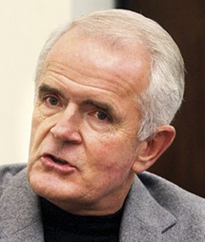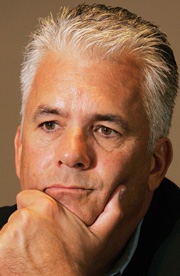Sunday, March 1, 2009 | 2 a.m.
In today's Sun
Sun Blogs
Sun Archives
- Architects press for 'pencil-ready' projects (2-27-2009)
- Leaked project list shorts Southern Nevada (2-26-2009)
- Hopeful, but wary of stimulus quo (2-26-2009)
- Obama speech draws varied responses from Nevada delegation (2-24-2009)
- How Obama's mortgage relief plan pencils out (2-21-2009)
- Reid responds to criticsm that he did not come through for Nevada (2-20-2009)
- What the stimulus plan would mean for Nevada (1-29-2009)
- Got stimulus? We've got a project list (1-17-2009)
- Mob museum is Exhibit A for GOP leader (1-6-2009)
As the final votes were being cast for President Barack Obama’s $787 billion economic recovery plan last month, Nevada’s lawmakers began a chorus of criticism, expressing disappointment that the $1.5 billion allocated to the struggling state was not greater.
Republican Sen. John Ensign complained Nevada didn’t do as well as other states and Republican Gov. Jim Gibbons said he was expecting more from Washington, given the state’s dismal economic outlook. Others, mostly fellow Republicans, soon followed.
Ensign produced documents showing that Nevada ranked second from the bottom among the states in per capita funding from the bill, just $559 — a ranking outside experts say does not give the full picture of the aid the state will get.
Lost in the uproar that has swept Nevada since the bill was signed into law Feb. 17 is an uncomfortable secret known by Ensign, Gibbons and virtually every elected official in Nevada: The stimulus bill was business as usual. Nevada has almost always ranked low in federal spending. In fact, Ensign campaigned on the theme 10 years ago when he first ran for the Senate.
Nevada’s politicians have long complained that federal formulas fail to keep pace with the state’s rapid growth. That’s part of the reason why Senate Majority Leader Harry Reid and other Nevada lawmakers have been so brash about going after earmarks — specially targeted money that can supplement federal spending.
But with earmarks banned from the stimulus bill and derided as pork spending, Nevada had little chance for extras. Changing long-standing spending formulas — giving some states less so Nevada gets more — would have been a tall order given the fast track the stimulus bill was on to get money into the economy swiftly.
“This is an issue that we’ve been battling since long before I came to Congress,” said Democratic Rep. Shelley Berkley, who is in her 11th year representing Las Vegas.
“The idea we can do this on the cheap or that somehow Sen. Harry Reid is going to rain manna from heaven or manufacture money in his majority leader’s office is absurd.”
By most estimates, Nevada is receiving $1.5 billion from the federal stimulus fund, with the biggest blocks of cash coming in three categories: Medicaid, a rising state cost, especially as the newly unemployed need health care ($450 million); a state stabilization fund to help Carson City pay for education and other basic services during the downturn ($387 million), and transportation improvements ($250 million).
The state will also receive $77 million to extend unemployment benefits to the 9.1 percent of Nevadans out of work and boost those benefits by $25 a week. The jobless will get a subsidy to help pay for health care through their former employers’ COBRA system. Money is also coming for additional food stamps.
And more money will flow to the paychecks of nearly 1 million individuals who benefit from a $400 personal income tax credit, while some Nevadans will receive a college tuition tax credit. Money is coming to the state for various energy programs, as well.
But Gibbons, a fiscal conservative, was hoping for more. His no-new-taxes campaign pledge has put him in a box with no realistic way to deal with a 34 percent decline in state revenues.
“The governor was surprised and a little disappointed we didn’t receive more in the stimulus package for the state,” Gibbons spokesman Dan Burns said.
Unemployment is so high in the state that if the jobless formed their own city it would be the fourth or fifth largest in Nevada, Burns said. “The governor feels Nevada deserved more because our state was particularly hard hit.”
In the Senate, Ensign was a fierce opponent of Obama’s bill and voted against it. Before the final votes were even counted, he sent out a news release bashing the amount in the bill for education in Nevada as among the lowest per capita in the nation.
“Anytime we have big bills like this that means Nevada’s taxpayers are subsidizing other states,” Ensign said. “We always get the short end of the stick with formulas.”
In coming days Ensign went on to produce additional analyses that showed Nevada ranked low in money coming for transportation, housing, energy and other areas.
Whether Nevada’s low ranking is an accurate measure of stimulus spending is a debatable point.
It’s true that transportation funding, for example, was distributed largely using the traditional formulas, the ones Nevadans say have given them short shrift over the years. Ensign’s analysis puts Nevada fourth from the bottom.
But when highway funding, the bulk of Nevada’s allotment, is separated out from the overall transportation figures, Nevada ranks 32nd. Mass transit, when separated out, is an area in which Nevada ranks 18th.
Money for the $387 million state stabilization fund was not allocated under old formulas. Instead, Nevada got the same proportion as every other state, according to sources including the National Conference of State Legislatures. Funding levels were determined by state populations, with a higher portion going toward school- and college-aged children.
Nevada is expected to save or create 34,000 jobs with the stimulus bill, more than most other states. But a study by ProPublica showed that per unemployed person, Nevada ranked at the bottom of the list, alongside Michigan.
Gibbons said the state’s problems are so deep and prevalent that something should have been done to give Nevada a leg up.
But federal funding formulas are complex pieces of art, painstakingly negotiated among lawmakers to build a national consensus that can win a majority of votes to pass. Some staffers spend hours tinkering with the formulas to find just the right tweak that can bring in money for one area without throwing off the balance.
Changing these long-standing equations overnight would be a heavy lift. Even Ensign concedes the slim chances. “States are not going to give up their money,” he said.
With Obama making it clear that earmarks would be off-limits, Nevada could not make up for the shortfall.
Yet there is one important area where Reid, along with Ensign, prevailed.
Reid’s staff engineered a sizable increase in Medicaid money for Nevada — the largest percentage increase of any state.
Health care costs are an enormous state burden — one that worsens with unemployment as former workers rely on state-funded medical care. Reid, Ensign and other lawmakers from hard-hit states had lobbied for an allocation that would give them a bonus over states that were not suffering with as high a rate of unemployment.
But other states were pushing back and successfully altered the bill in a Senate committee. Even so, Reid and Ensign worked the Senate floor to ensure hard-hit states got extra help.
In the final negotiations Reid carried out, that provision was included, as well as a separate one that ensured the formula would be based on state’s greatest recent patient load, rather than when times were better.
Joy Johnson Wilson, health policy director at the National Council of State Legislatures, said both those provisions made a significant difference for hard-hit states. “That’s an important piece of the formula,” she said.
Throughout the now two-week-long firestorm stretching from Washington to Carson City, politics have underlined the debate.
Neither Ensign nor Gibbons criticized Reid by name, unwilling to publicly attack not only the most powerful Democrat in Nevada, but among the most powerful in Washington. Plus, Ensign and Reid have a long-standing agreement not to criticize one another in public, part of a truce reached after Ensign eventually won his Senate seat in 2000.
Gibbons’ office insists there is no one to blame.
But Reid is up for reelection in 2010. Anything that weakens perceptions of one of his signature strengths — his ability to unabashedly bring earmarked federal money back to his state — could be a productive line of attack.
Reid’s office has a ready reply. “Sen. Reid got Nevada a heck of a lot more money than Gov. Gibbons was expecting,” said Summers, Reid’s spokesman. “It may be something he may want to remember.”
His office reminds that there wouldn’t even be a stimulus package if not for the delicate compromise Reid helped broker to bring three Republican senators on board to pass the bill.
Berkley added: “If it wasn’t for Sen. Reid, the stimulus wouldn’t have happened. Period.” Her office said the critics are like the diner who complains that a restaurant’s food is bad — and the portions are small.
“I find it strikingly hypocritical that those who complain the most about the high cost of the stimulus package and the so-called wasteful spending are the ones yelling the most now about Nevada not getting enough,” she said.
Gibbons, in fact, was among the Republican governors who supported the stimulus bill and urged the delegation to pass it with terms favorable to Nevada, including an education provision that ended up in the final product.
But the governor, who had been a congressman for 10 years in Washington before coming to Carson City in 2006, saw no greater need to push for changing the federal formulas, his spokesman said.
“I don’t think it was necessary for the governor to parade around and have a letter-writing campaign,” the spokesman said.
What remains untold in the debate is something Mark Muro of the Brookings Institution says is the numerator in the equation — exactly how much money will ultimately come to Nevada as the economy shifts.
For example, the $3.2 billion in loan money that will be made available to build energy transmission lines in the West could result in jobs for Nevada if NV Energy or another potential applicant succeeds in getting the money to build a line across the state.
Similarly, the much-ridiculed $8 billion for high-speed rail that could help develop a proposed line between Las Vegas and Disneyland could bring additional jobs to the state.
Reid’s office adds to that list the benefit that comes to Nevada from building up other states’ economies.
“If we don’t have a strong national economy, do you think people are going to travel to Nevada?”
Summers said. “What’s going to get those unemployed tourism workers back to work? — putting money in people’s pockets so they can travel to Nevada. Tell me how you quantify that. You can’t. You can’t put a per capita number on that.”
But just to be sure Nevada gets its due, Reid has earmarked $100 million for the state in the next spending bill.
If you hated the stimulus for shortchanging Nevada, you’ll love the next new bill.



Join the Discussion:
Check this out for a full explanation of our conversion to the LiveFyre commenting system and instructions on how to sign up for an account.
Full comments policy